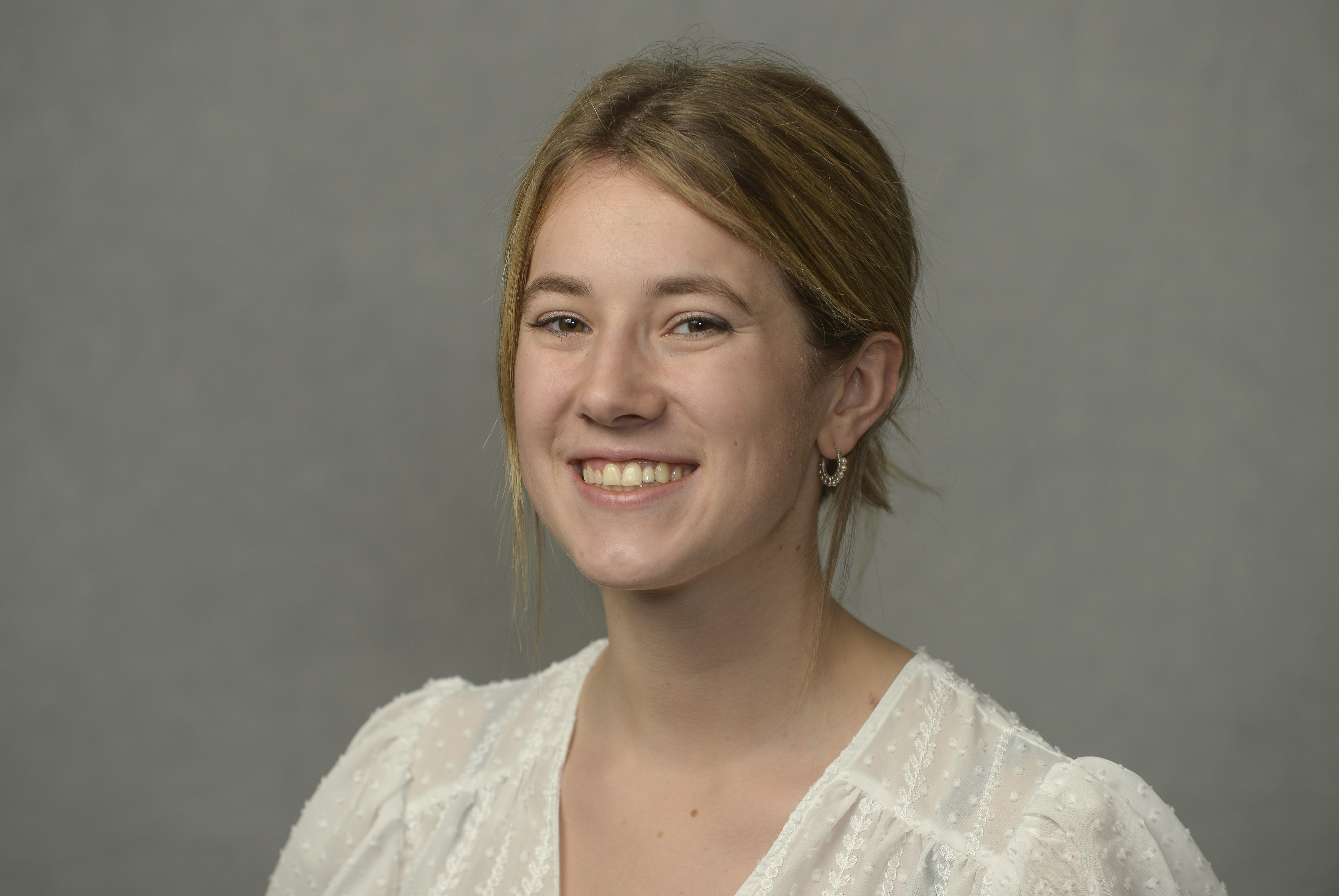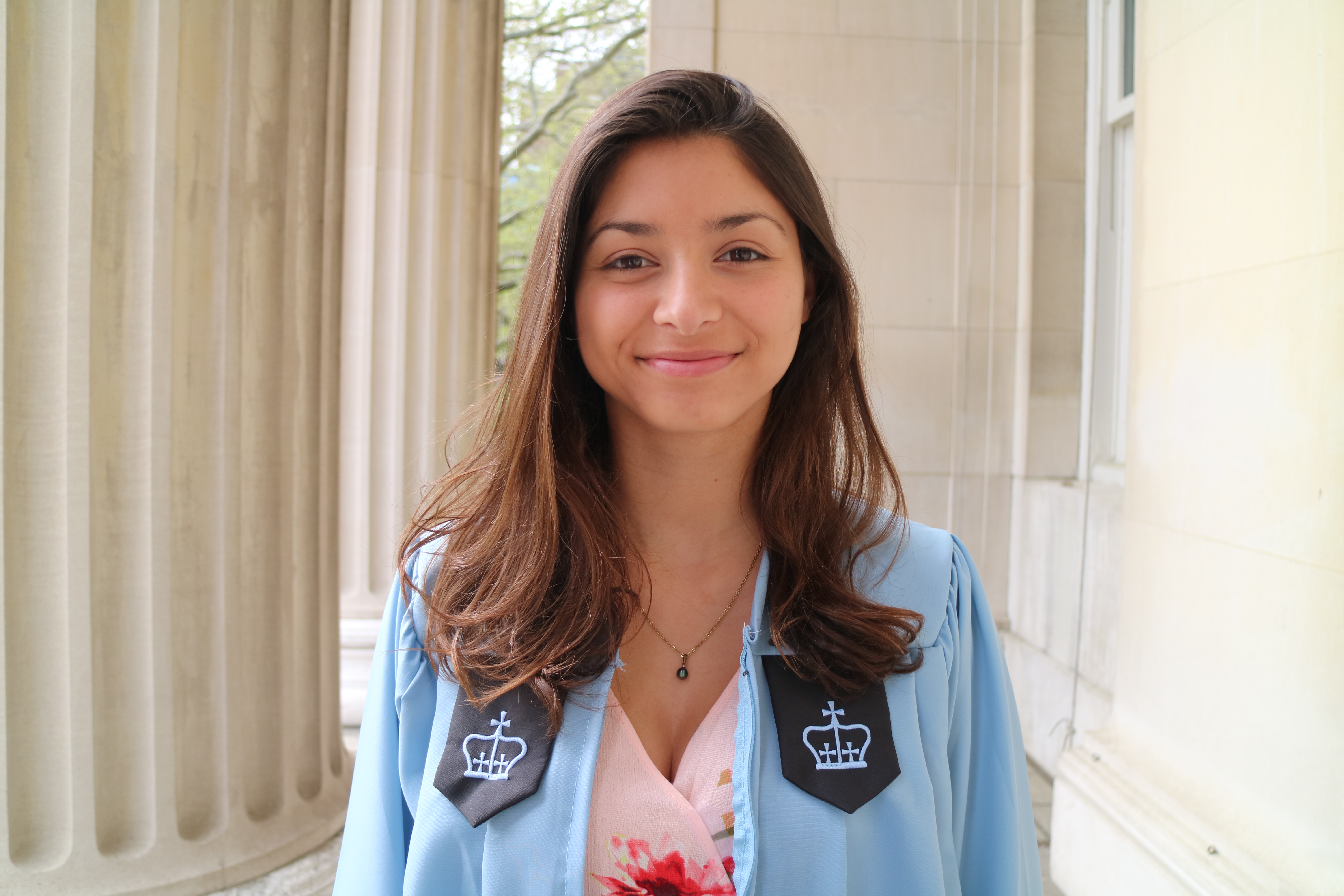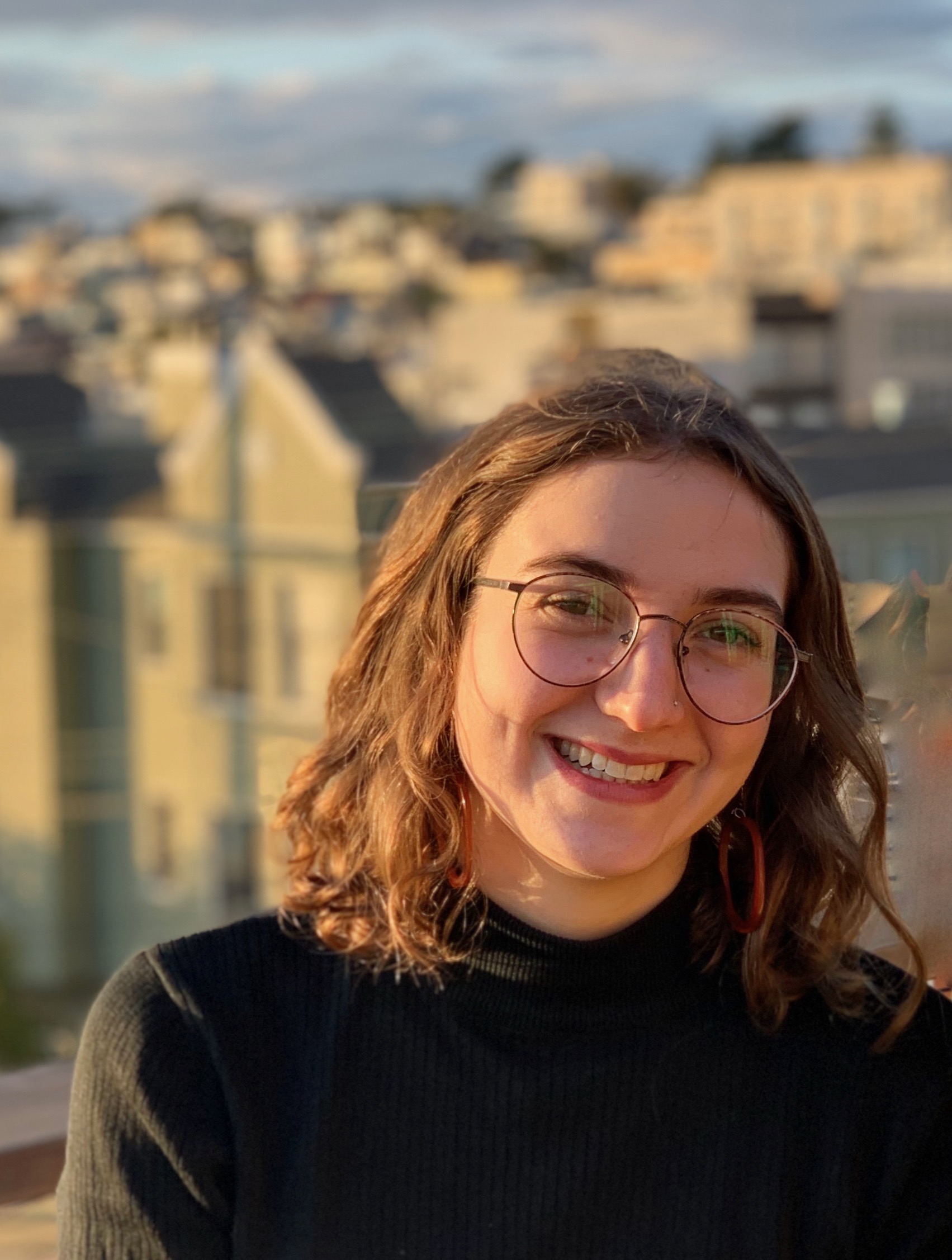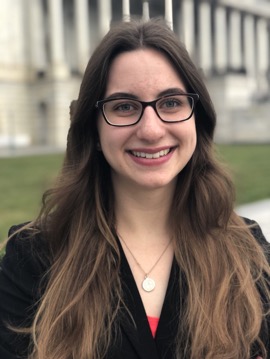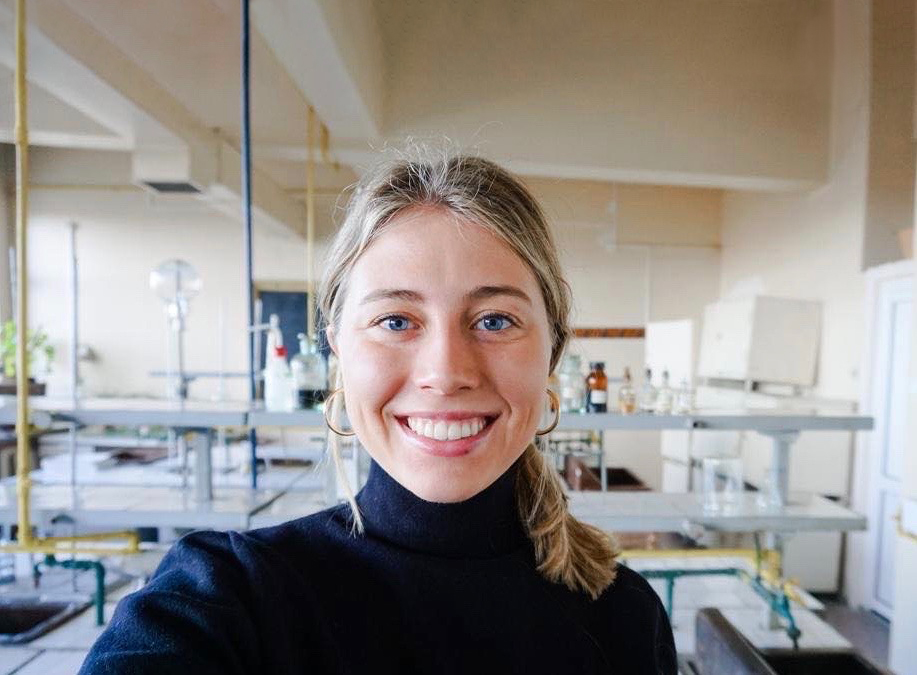[Photo, L-R: Abigail Andrews ’19, Blanca Alvarez Caraveo ’19, Anna Coerver ’20, Rachel Dziatko ’18, Elizabeth Wiita ’19]
The National Science Foundation (NSF) Graduate Research Fellowship Program (GRFP) recently named five Barnard graduates as Fellows to pursue research-based advanced degrees — an increase from the previous two years. (Past results can be found here.) Abigail Andrews ’19, Blanca Alvarez Caraveo ’19, Anna Coerver ’20, Rachel Dziatko ’18, and Elizabeth Wiita ’19 will receive annual stipends of $34,000 for three years, $12,000 in education allowances to help offset tuition and fees, opportunities for international research and professional development, and the ability to conduct their own research at any accredited graduate school in the U.S.
“The excellence of our students across the fields that NSF represents — from engineering, chemistry, and physics to the social sciences — speaks to the breadth of Barnard’s intellectual strengths,” said Provost Linda Bell. “Barnard students have so many opportunities to work closely with faculty in the development of original research at the undergraduate level, which in turn prepares them for success in their graduate endeavors.”
“The opportunity to do original, fundamental research and to be the person who takes ownership of a project and drives it forward is extremely valuable,” said Andrew Crowther, assistant professor of chemistry, who mentored Dziatko in his laboratory from the summer after her first year through graduation. “Barnard College supports this effort via research during the academic year and through the Summer Research Institute (SRI).”
Provost Bell emphasized the College's commitment to resume SRI in 2021, following an unfortunate but necessary pause in summer programming in 2020 due to COVID-19. “The results of this year’s NSF GRFP awards speak for themselves when it comes to the impact of SRI on research excellence at the College,” she said. “We remain deeply committed to supporting this transformational program.”
“It’s an incredible feat to have five winners within the same cohort,” said Jennifer Lech, associate director for fellowships and research at Beyond Barnard, which coordinates the administration of the faculty-led SRI. Beyond Barnard also provides current students and alumnae with advising and resources toward career exploration and development, as well as opportunities for experiential education, preparation for graduate and professional school, and support for applications to competitive national and international fellowships, such as NSF GRFP, Fulbright, and others.
The five NSF GRFP Fellows, recognized as promising students in STEM and social science disciplines and majors, are:
Abigail Andrews ’19 (Environmental Policy) is pursuing her Ph.D. in civil engineering at Stanford University as a member of the Urban Informatics Lab. Her research focuses on the design and implementation of more robust building benchmarking models. Building benchmarking examines how efficiently a building uses energy. However, these models are often statistically imperfect and largely ignore the well-being of building occupants. Optimizing benchmarking models to mine synergies of energy efficiency and occupant well-being assists in the transition towards a lower-energy future while maintaining standards of well-being.
“The Environmental Science Department at Barnard provided a quantitative toolbox that allows me to use holistic and empirical approaches in my research,” said Andrews. “My degree, while technical, explored the interactions of human, political, and economic systems to the urban environment. I am proud to be a Barnard alumnae in engineering!”
Blanca Alvarez Caraveo ’19 (Environmental Science, minor in Science, Public Policy, and Ethics) is currently a first-year Ph.D. student at the University of California, Los Angeles, in the Atmospheric and Oceanic Science Department. Alvarez Caraveo studies marine calcifiers, organisms that make their shells out of calcium carbonate such as corals, muscles, and calcifying phytoplankton. She researches mechanisms behind marine calcifiers’ resiliency to ocean acidification, specifically rapid genetic adaptation and their ability to internally regulate their calcification fluid pH. Alvarez Caraveo is an AAUS scientific diver and will conduct her fieldwork on a CO₂ seep off the coast of the Galápagos Islands. She hopes to understand how marine calcifiers adapt to these low pH environments.
“While at Barnard, I was fortunate to have incredible faculty members in the Environmental Science Department who were invested in my early scientific career,” said Alvarez Caraveo. “I was given the opportunity to work as a lab assistant my first semester, allowing me to find my passion for science early on and be competitive for internships and research opportunities throughout my undergraduate career. The support of my mentors and peers at Barnard developed my confidence as a scientist and gave me the assurance to pursue my Ph.D. in biogeochemistry.”
Anna Coerver ’20 (Physics) graduated early from Barnard in December 2019. Coerver’s undergraduate research experience included high-energy observational astrophysics, particle physics, and experimental cosmology. She has been accepted to a number of top programs and will be pursuing a Ph.D. in either experimental physics or astrophysics starting this fall.
“At times, being a woman in physics can be challenging, and belonging to a department that supports me and the pursuit of my goals has been invaluable,” shared Coerver. “Barnard’s collaborative and accepting environment was an amazing place to fall in love with physics. I’m excited to enter graduate school as an NSF Graduate Research Fellow and to conduct cutting-edge research while working to make physics a more inclusive and accessible field!”
Rachel Dziatko ’18 (Chemistry) performed research for more than three years during her undergraduate studies at Barnard and is currently a second-year graduate student at Johns Hopkins University studying the photophysics of aluminum nanoparticles in the Bragg Lab. With the support of the NSF GRFP, she will develop new methods for studying aerosolized nanoparticles and explore their potential application in the enhancement of photocatalysis.
“At Barnard, I studied the chemistry of graphene and molecular clusters using a variety of techniques, which led to two publications and presentations at multiple conferences,” explained Dziatko. “The opportunity to conduct cutting-edge research in combination with the overwhelming support from the Chemistry Department allowed me to develop my skills as a critical thinker and writer. These skills, along with spending four years surrounded by incredibly intelligent and inspiring peers, gave me the toolkit I needed to pursue graduate studies and apply to the NSF GRFP.”
Elizabeth Wiita ’19 (Chemistry) pursued research for three years while at Barnard and spent the year following graduation exploring environmental chemistry fields. She researched the presence of arsenic in rice and water sources in Cambodia and, later, synthesized renewable energy solutions as a Fulbright scholar in Romania. Next year, she will begin a doctoral program in the environmental physical-chemistry field. Wiita is still debating between Ph.D. and DPhil degrees in both physical and theoretical chemistry and earth sciences.
“The education and mentorship I received at Barnard was instrumental in teaching me how to write a successful NSF GRFP proposal that not only proposes salient interdisciplinary research but also aims to promote scientists from underrepresented backgrounds globally,” said Wiita. “My future research intends to elucidate environmental chemical processes across different cultures and research teams, bringing the world closer together as we work to understand our changing environment. The Barnard community taught me that the importance of research is not only about making scientific advances but also about sharing these opportunities with others.”
“These students and alumnae have demonstrated exemplary commitment to their research and are shining examples of the caliber of fellows the National Science Foundation selects,” continued Lech. “The NSF GRFP will provide each of them with transformative academic and research experience to equip them with the skills, knowledge, and community they need to bolster their continued success as research scientists, teachers, and innovators.”
The NSF GRFP is the oldest fellowship of its kind, with a well-established reputation for recognizing and supporting the most promising graduate students in NSF-supported STEM and social science disciplines. Past fellows include Google co-founder Sergey Brin and numerous Nobel Prize winners, such as physicist and former U.S. Secretary of Energy Steven Chu. For more information, please visit nsfgrfp.org/general_resources/about.
